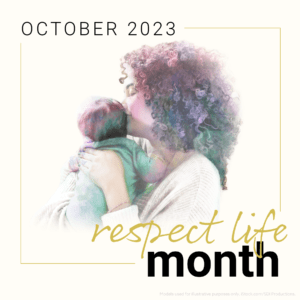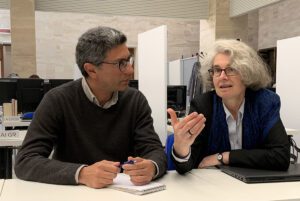WASHINGTON (OSV News) – U.S. pro-life efforts “must remain strong to end legalized abortion” in this nation, but all Catholics have a personal responsibility to accompany women facing difficult or challenging pregnancies, said the chairman of the U.S. Conference of Catholic Bishops’ Committee on Pro-Life Activities.

Bishop Michael F. Burbidge of Arlington, Virginia, invited Catholics into “radical solidarity” with pregnant women in a Sept. 18 statement commemorating the 50th anniversary of Respect Life Month in October. The U.S. bishops set aside the month “as a time to focus on protecting God’s precious gift of human life,” he said.
“While ending legalized abortion remains our preeminent priority, the most immediate way to save babies and mothers from abortion is to thoroughly surround mothers in need with lifegiving support and personal accompaniment. This is radical solidarity,” Bishop Burbidge said.
St. John Paul II first defined “radical solidarity” in this way, the bishop said, quoting from the pope’s book “Crossing the Threshold of Hope” (1994): “In firmly rejecting ‘pro-choice’ it is necessary to become courageously ‘pro woman,’ promoting a choice that is truly in favor of women. … The only honest stance, in these cases, is that of radical solidarity with the woman. It is not right to leave her alone.”
“Being in radical solidarity with women who are pregnant or raising children in difficult circumstances means putting our love for them into action and putting their needs before our own,” Bishop Burbidge said. “Pope Francis reminds us that solidarity ‘refers to something more than a few sporadic acts of generosity. It presumes the creation of a new mindset,’ a transformation within our own hearts.”
Bishop Burbidge said there is much to celebrate about the overturning of Roe v. Wade by the U.S. Supreme Court. In June 2022, the high court overturned its prior rulings that made abortion access a constitutional right — its 1973 Roe decision and its 1992 ruling in Planned Parenthood v. Casey, which affirmed Roe. The court’s Dobbs v. Jackson Women’s Health Organization decision returned the issue of abortion regulation to the states.
Twenty-two states have moved to ban or restrict abortion, although not all of those efforts are currently in effect amid court challenges.
“While we thank God that the terrible reign of Roe has ended, we also recognize that abortion still continues in most states and is aggressively promoted at the federal level,” Bishop Burbidge said. “A great many prayers, sacrifices, and good works are still desperately needed to transform a culture of death into a culture of life. Our public witness, our marching, and our advocacy must continue, yet laws alone will not end the tragedy of abortion.”
But “the new mindset” of which Pope Francis speaks “requires that we come alongside vulnerable mothers in profound friendship, compassion, and support for both them and their preborn children,” Bishop Burbidge said.
This also “means addressing the fundamental challenges that lead an expectant mother to believe she is unable to welcome the child God has entrusted to her,” he continued. “This includes collective efforts within our dioceses, parishes, schools and local communities, engagement in the public square, and pursuit of policies that help support both women and their preborn babies.
“It all the more so requires our individual, personal commitment to helping mothers in our own communities secure material, emotional, and spiritual support for embracing the gift of life,” he said. “Radical solidarity means moving beyond the status quo and out of our comfort zones.”
An example of the church’s outreach to pregnant and parenting mothers is the U.S. bishops’ parish-based and nationwide initiative Walking with Moms in Need. “(It) provides easy-to-follow, step-by-step instructions to help transform our parishes into places of welcome, support, and assistance for pregnant and parenting mothers facing difficulties,” he explained, urging Catholics to get involved in the initiative.
In his statement, Bishop Burbidge included a number of questions he said Catholics must ask themselves: “Do I know what efforts are happening in my area to help women who are pregnant or parenting in difficult circumstances? What are the needs? What are my gifts and talents? How can I adjust my schedule or budget to assist efforts to help moms in need and their children?”
“Radical solidarity can be lived out in countless ways,” he said, “including volunteering at your local pregnancy center; helping an expectant mother find stable housing; babysitting so a mom can work or take classes; providing encouragement and a listening ear to a mom without a support system; or speaking to your pastor about beginning Walking with Moms in Need at your parish.”
Along with “enshrining pro-life laws and policies” is the need to transform the culture, which “requires continual conversion of our own hearts, so that we can recognize in every person the face of Christ and place their needs before our own,” Bishop Burbidge said.
He concluded his statement by reiterating his invitation to all Catholics “to think about building a culture of life in terms of radical solidarity” during Respect Life Month this October.
“We are the Church. Our prayers, witness, sacrifices, advocacy, and good works are needed now, more than ever,” he said. “We are the hands and feet of Christ in the world today and we each have a personal responsibility to care for one another.”

